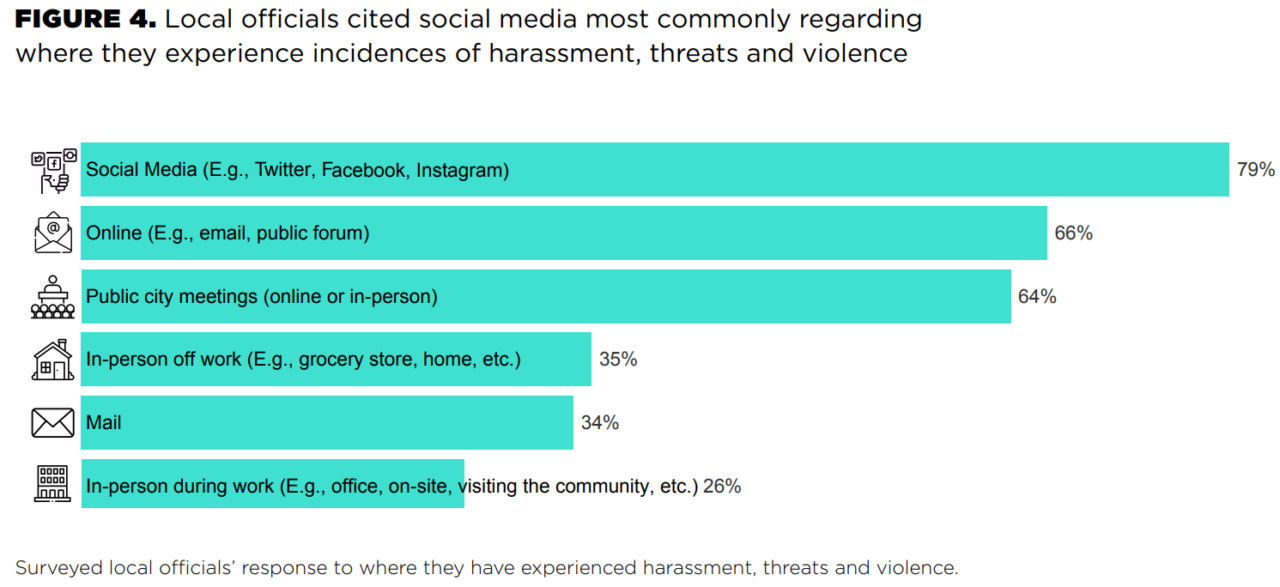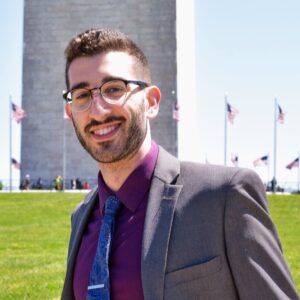We are losing our ability to meaningfully and appropriately engage with each other in political discourse. According to a 2021 Washington Post-University of Maryland poll, more than one-third of Americans believe violence against the government is justified, a figure that has more than doubled over the last decade. In response to this disturbing but growing number of attacks against local leaders, in November NLC released a report, On the Frontlines of Today’s Cities: Trauma, Challenges and Solutions, to elevate local leaders’ experiences with violence from their community members and offer insights on how to mitigate and respond to attacks.
NLC’s research finds that 81 percent of surveyed local officials have experienced harassment, threats and violence. Although most harassment occurs online, the frequency at which our local leaders experience harassment, threats and violence in person is still very high. 64 percent of surveyed officials reported experiencing these threats during public city meetings, while 35 percent said they encountered harassment, threats and violence in-person while off work (for example, at their homes, at the grocery store, etc.).

Many factors contribute to this growing trend, including extreme hyper-partisanship, the spread of mis- and dis-information and the growing influence and power of social media. While a diversity of opinions and ideologies are healthy in democratic society, the heightened antagonism between people and parties who disagree politically is plaguing American democracy.
Regardless of our political affiliation or ideology, we should all reject a political environment that allows harassment, threats and abuse against public officials to occur. Public officials are people too, and should not be treated as less than because of their accountability to voters. Receiving harassment from community members makes it harder for elected officials to carry out their duties because engaging with constituents can become a safety risk for some. Because of their negative experiences, some officials have quit, creating a local leadership void in their communities. Often, public officials’ gender, race, religion or sexuality have made them targets, inhibiting the diversification of government. These challenges present real threats to American democracy.
What makes these trends worse is the fact that many local governments aren’t prepared to deal with these threats. Although 81 percent of local officials surveyed by NLC have experienced harassment, threats and violence, only 40 percent indicated that their government has a strategy or action plan in place to respond to or mitigate incidences of extreme constituent behavior. But there are steps that local governments and individuals can take to mitigate and respond to these threats – and NLC’s three-pronged approach to addressing these challenges is a key place to start. NLC’s three-pronged approach, which was developed based on interviews and surveys with NLC members and experts, prioritizes securing the physical safety of public officials, promoting mental health and well-being and improving civil discourse.
In the meantime, these challenges are ongoing. In March 2022, Boise, ID Mayor Lauren McLean, released a statement condemning the uptick in harassment, threats and violence toward officials in her county. NLC applauds Mayor McLean and all local leaders across the nation for their resilience and responses to these threats in these unprecedented, challenging times.
NLC is committed to continuing research on and providing support for communities and individual local leaders facing harassment, threats and violence, and aims to provide local leaders with more resources to address these challenges. Through this work, we hope to offer local leaders a safe platform to share their stories and strategies to support the physical and mental wellbeing of themselves and their staff.
Connect with Us
To support NLC’s research or connect with us about your own experiences facing harassment, please email us.










